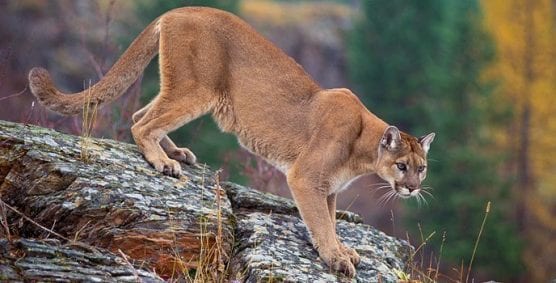Wildlife organizations asked the California Department of Fish and Wildlife Tuesday to provide new protections for mountain lions in the Golden State.
The Mountain Lion Foundation and the Center for Biological Diversity asked the state agency to grant mountain lions formal protection under the California Endangered Species Act, which would give the animals special protections under state law.
“It’s time to recognize the threats that face mountain lions and improve our ability to protect them, because they matter for their own sakes and have significant value to all Californians,” Mountain Lion Foundation executive director Lynn Cullens said. “Very few young lions can make their way through the maze of homes that dot the hillsides of Southern California. They can’t cross eight-lane freeways to find a territory and establish a home.”
Habitat loss is one of the major reasons the cougar population has dwindled over the last few decades.
“Our latest work on mountain lion genetics throughout the state suggests that populations along the coast from the Santa Cruz Mountains and east bay hills south to the Mexican Border are highly isolated and will likely face long term declines unless work is done to maintain and enhance connectivity with other populations,” University of California, Santa Cruz, professor Chris Wilmers said.
Wilmers runs the Santa Cruz Puma Project.
The consequences of dwindling predator populations in the coastal mountain region of California include ecological repercussions, such as the explosion of the prey species mule deer.
Mountain lion kills also provide an important food source for foxes and the endangered California condor. The presence of the species also enables vegetation that would otherwise be eaten by mountain lion prey to flourish, creating habitats for other species, including endangered butterflies.
The disappearance of mountain lions may also harm humans. Studies have shown increased incidences of deer and vehicle collisions where mountain lions are absent and a spike in tick-borne illnesses spread by deer, including Lyme Disease.
As marijuana farms proliferate throughout California, there are more cases of wildlife rodenticide poisoning, in which mountain lions either ingest the poison directly or prey on infected rodents.
Mountain lions can also come into conflict with livestock operators, who sometimes kill the animals to protect their own animals or in retaliation.
“Our mountain lions are dying horrible deaths from car collisions and rat poison, and their populations are at risk from inbreeding, too,” said Tiffany Yap, a biologist with the Center for Biological Diversity who authored the petition.
“Without a clear legal mandate to protect mountain lions from the threats that are killing them and hemming them in on all sides, these iconic wild cats will soon be gone from Southern California,” she added.
Under state law, the fish and wildlife agency will have three months to make a recommendation to the fish and wildlife commission, which will vote on a recommendation at a public hearing later this year.
If the state grants formal protection to mountain lions, measures to preserve their natural habitat links and to provide wildlife corridors under highways may be implemented.
— By Matthew Renda
Like this:
Like Loading...
Related





 Tweet This
Tweet This Facebook
Facebook Digg This
Digg This Bookmark
Bookmark Stumble
Stumble RSS
RSS


























REAL NAMES ONLY: All posters must use their real individual or business name. This applies equally to Twitter account holders who use a nickname.
0 Comments
You can be the first one to leave a comment.